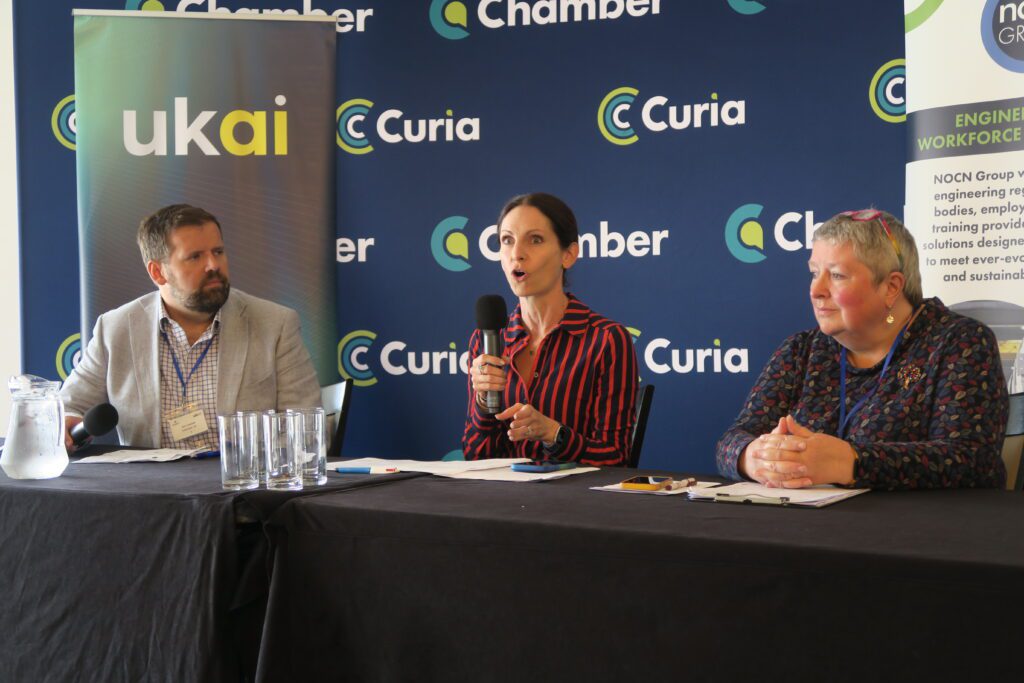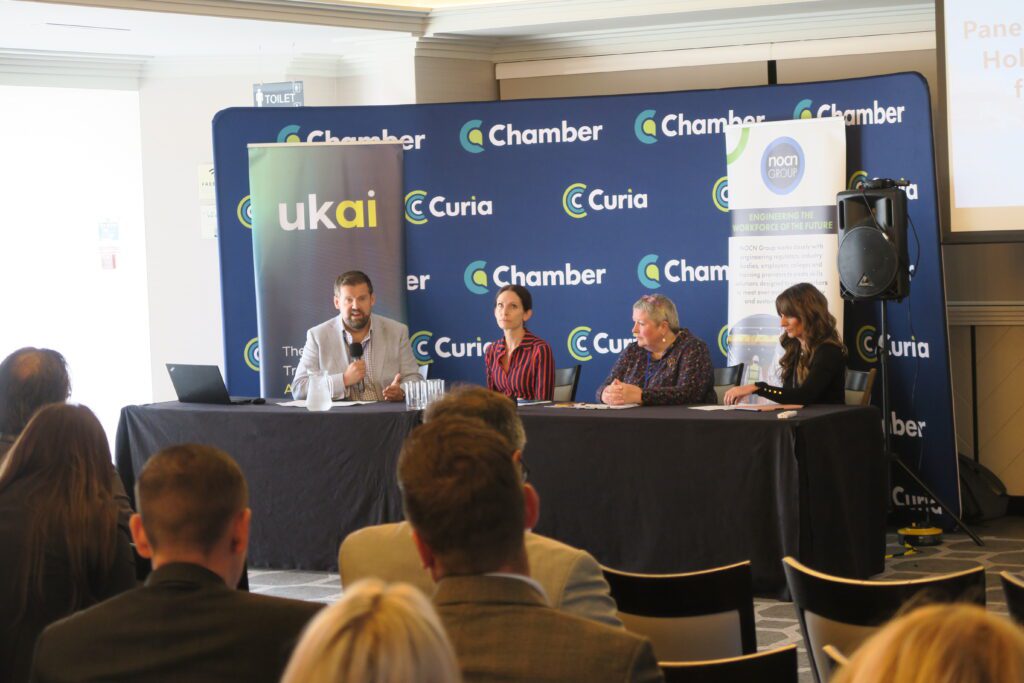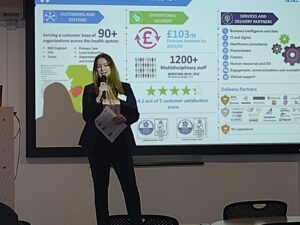On Thursday 11th September, Chamber Group, Curia and UKAI heard from Aphra Brandreth MP, Councillor Judith Derbyshire, Laura Randall, the head of Business Development at NOCN Group, and Chamber UK’s Ben Howlett at the ‘Get Britain Growing’ North West Conference. During their Growth panel discussion, the second of the day, the speakers explored Liverpool’s role in driving regional and national economic growth, and its symbiotic relationship with AI and technology.
Strategic Economic Development in the Northwest
Aphra Brandreth opened discussions on Strategic Economic Development in the Northwest by celebrating the North West’s immense contribution to the sector: ‘we are […] the third biggest contributor to the UK’s defence industry. And what we contribute is more than the Welsh and Scottish defence industries put together’. Combined with sheer statistical power (49,000 jobs and 128 ‘really important companies’), to Brandreth, is the ‘big heritage’ of the North West’s long history of defence production.
From heritage shipbuilding at Cammell Laird to the nuclear submarine programme in Cumbria, the defence sector anchors regional prosperity and national security. She discussed the need for a coordinated strategy between technology and defence, bringing advanced manufacturing, supply chain, economy and AI together to put forward a coherent case to government to secure investment. Brandreth is keen to conjoin existing industrial forces with burgeoning innovation strategies, to ward off stagnation or arrested growth.
Infrastructure, Housing, and Connectivity
Councillor Judith Derbyshire drew the oft-cited comparison between growth constraint and poor connectivity and infrastructure, including limited broadband access and weak transport links. She explained the importance of upgrading the A66 and A590, electrifying the North Wales main line, and improving links between Southport, Cumbria, and Merseyside.
Inextricably connected, of course, is housing. Derbyshire highlighted the challenge of ‘social rented housing, especially in Central Lake District’ – a marked struggle due to high numbers of ‘important but low wage jobs working in the hospitality, tourism industry’, without the infrastructure to house employees. Local initiatives such as Barrow Rising and Marina Village, she explained, are repurposing brownfield land and bringing empty homes back into use, while tackling the impact of second homes and energy inefficiency on communities and affordability.

Skills, AI, and Future Workforce Growth
Laura Randall from NOCN described the coordinated regional Skills Compact, which has been proposed to connect employers, training providers, and awarding bodies. The other participants celebrated this, calling for flexible, inclusive qualifications that address real-world gaps and embed transferable skills such as digital literacy, sustainability, and problem-solving.
Randall celebrated the major opportunities for productivity and public service transformation afforded by AI and digital innovation. But she also called for clearer pathways, improved practical training, and greater public and institutional confidence to adopt these technologies responsibly: ‘it’s about future proofing really, rather than just developing qualifications for now. We’ve got to be thinking more into the future’.
‘We’ve got to be thinking more into the future’
Local Procurement and Economic Inclusion
Aphra Brandreth explained the advantage of local procurement (encouraging sourcing and supply from local businesses), to generate growth for smaller businesses. She insisted that they need ‘security […] so they can scale up and grow’: ‘supporting them to become the big businesses of tomorrow is really vital’. Collaboration between councils, businesses, and anchor institutions will be key to unlocking this potential.
Devolution and Collaboration
Devolution was largely welcomed as an opportunity to align decision-making with local priorities, but Brandreth raised concerns about the risk of added bureaucracy: ‘the devolution piece I’m slightly staying out of […] I do have some concerns about whether you’re just going to end up with an extra layer of government’. She explained that collaboration and devolution need to ‘really champion an area’, and not just ‘end up costing a lot of money and not delivering the actual outfits that we really want’. Participants called for greater cross-council collaboration, particularly between mayors across the political spectrum, to accelerate progress on transport, housing, and economic strategy.
Ultimately, the panellists agreed, if Britain is to grow, it will start in places like the North West, where innovation meets industry, and collaboration drives change. The challenge now is to turn strategy into delivery, ambition into action and promises into real, experienced, growth.




